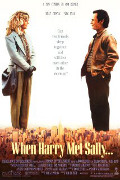
Directed by
Rob Reiner
96 minutes
Rated M
Reviewed by
Bernard Hemingway


When Harry Met Sally
When Harry Met Sally was a surprise hit in its day and it deservedly remains a much-loved comedy for whilst being both romantic and funny it also manages to feel authentic and be a quite poignant portrait of the relationship between men and women in the late 1980s. This winning combination is due largely to Nora Ephron’s fine script and the zesty performances by Billy Crystal and Meg Ryan.
The film opens in 1977 when Harry and Sally are graduates of the University of Chicago and sharing a ride to New York City to start their adult lives. Along the way, they argue about everything including whether men and women can be friends. She believes so, he is adamant that the man’s sex drive will always dominate his perception of the woman. They part agreeing to disagree. Harry gets married and Sally gets involved in a serious relationship but when coincidentally they meet 10 years later both are newly single and their vulnerability draws them together in what both recognize as a friendship.
Ephron’s script is beautifully judged. Harry and Sally are polar opposites and the see-saw of their various encounters provides the dynamic that keeps the story bubbling along. Whilst being amusing it never feels less than mature or falls back on contrivance in order be funny, Here Billy Crystal’s cynical wisecracking style is not only appealing but he does a fine job in making Harry an ultimately vulnerable character. Ryan, in a performance that would define her career, is also excellent as the peppily optimistic but equally vulnerable Sally. Carrie Fisher and Bruno Kirby provide solid support whilst Woody Allen-like, Reiner occasionally interrupts proceedings and inserts documentary-style clips from interviews with old married couples relating their stories. A romantic comedy is a romantic comedy but When Harry Met Sally is a particularly good one, perhaps the last good one before post-romantic sexual mores and raunch comedy overtook the mainstream. .
FYI: Ephron revisited the genre with Sleepless In Seattle (1993) and You’ve Got Mail (1998) both of which she scripted and directed and starred Ryan and Tom Hanks but typically, the law of diminishing returns applied.
Want something different?





